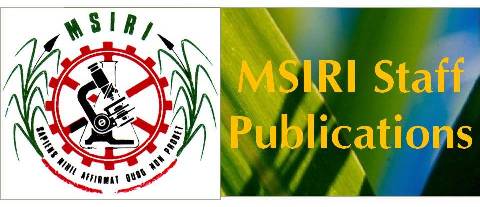Inheritance of agronomic traits in commercial hybrid sugar cane populations in contrasting environments and in different crop cycles
| MSI99P3205 | |
| Ramdoyal, K. Badaloo, G. | |
| Inheritance of agronomic traits in commercial hybrid sugar cane populations in contrasting environments and in different crop cycles | |
| Periodical article | |
| 1998 | |
| J. Genet. and Breed. | |
| 52: 361-368 | |
| En | |
| En | |
| A study on variation and inheritance of cane and sugar yield and their components was conducted on twenty bi-parental families representative of commercial hybrid sugar cane (Saccharum spp) populations in two contrasting environments and in two crop cycles, plant cane and first ratoon. There were highly significant differences between families and between family variation was more important than within-family variation. Heritability estimates agreed moderately well in the two crop cycles although this agreement could be better in one environment as compared to another one and shows that heritability estimates will change to some extent in different environments and crop cycles. When pooled over crop cycles, heritability estimates agreed quite well between the two environments. Generally heritability estimates between environments were in better agreement for the ratoon crop relative to the plant cane crop whatever methodology used for calculating these estimates. Similarly, when pooled over environments, heritability measured from regression analysis compated quite well with the estimates derived from BIP analysis. This agreement was again better for the ratoon crop as compared to the plant cane crop Estimates of heritability varied from low for stool weight and sugar yield to mederately high for fibre percent cane. Cane diameter and length of internode were the most heritable traits among the biomass characters and the cane quality characters, field Brix and pol per cent cane were moderately heritable traits. Maternal influence tended to be more pronounced for the cane quality characters whereas the regression coefficients tended to show that stalk heights and stalk elongation rates during the growth phases as well as millable cane height were closer to the paternal mean. The implications of these results are discussed particularly from a hybridization point of view in an overall breeding strategy. | |
| SUGARCANE GENETICS AGRONOMIC TRAITS BI-PARENTAL PROGENY ANALYSIS CROP CYCLES ENVIRONMENT HERITABILITY OFFSPRING-PARENT REGRESSION | |
| MAURITIUS | |
| Cane breeding and genetics | |
| Commercial varieties | |
| 1999-04-16 | |
| En | |
| LIB | |
| CAT | |
| PB |
